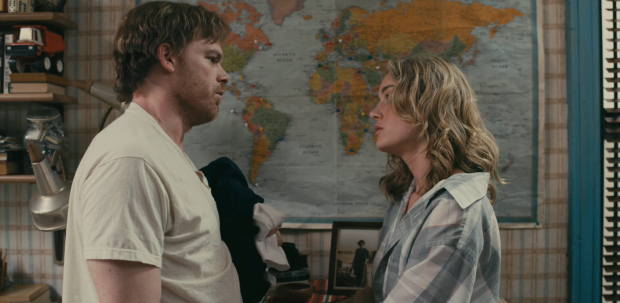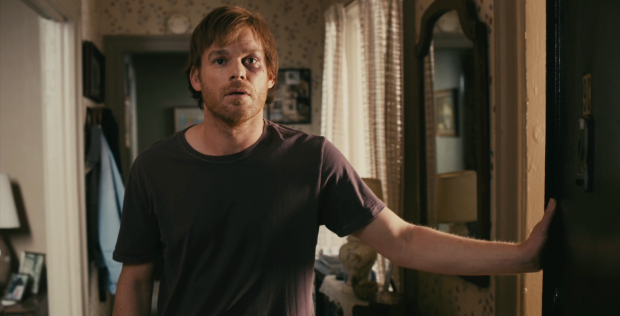Think of Michael C. Hall‘s character in The Trouble with Bliss as similar to Jason Segel‘s creation in the recent Jeff, Who Lives at Home. Minus the stoner part, that is. And minus the semi-interesting philosophical bent, too. Morris Bliss (Hall) lives out of his father’s (Peter Fonda, who’s lazily asked save it all for one scene) New York City apartment, cuddled up in his cornered-in bedroom that has a map full of tick marks of all the places he’s never been to — but, you know, the ones he will obviously have been to once he gets past 40 and finally realizes that impulsive globe-hopping isn’t the best activity to save for the golden years.
Morris has no job, no motivations, and no interests. (Well, I guess he reads, because the opening scene shows us his impressive book collection. Never mind that it’s hardly referred to again.) For him, a day’s work consists of setting out to buy groceries with his dad’s provided money, and ultimately wandering through the city with a slice of pizza in tow. When he arrives back home, grocery-less, he instantly crashes on his bed, because who wouldn’t be wiped after such an industrious, productive day?
Naturally, all of these qualities make Morris a magnet for ladies of all ages. He’s in a record store one day, and moments later finds himself making out with a school-uniformed teenager, Stephanie (Brie Larson), in the back. Cute twist: Stephanie turns out to be the daughter of one of Morris’s former high school classmates, a man referred to as “Jetski.” I would like to take this time to personally apologize to Brad William Henke for being saddled with such a gratingly annoying character.
Not to worry, the phoned-in writing doesn’t end there. Lucy Liu appears briefly as a neighbor of Morris’s who feels neglected by her husband (Scott Johnsen). Her attraction to Morris, which develops over the course of an entire beer (or maybe it was just half a glass), is even more actively artificial than Stephanie’s. Chris Messina makes his own off-and-on appearance as Morris’s closest friend. I won’t bore you with the sheer weirdness of the subplot that his character propels.
The Trouble with Bliss is the kind of indie-vibe character study that is full of fabrications as opposed to genuine hurdles and legitimate broken ground. That Morris is stuck in a standstill is obvious, but we’re not really sure why — his mother, as we learn early on, died when he was young, but it rarely seems as if that is what’s actually on his mind. Nor are we given a reason to care, or a sense that there’s some depth to Morris’s character. Hall is capable of playing the role, but his dried-up demeanor is rendered ineffective when there’s literally nothing under the surface for him to hint or grab at.
I found myself peeved in the same way at the drawing of Larson‘s character. Here’s a good, interesting actress — she was an outright firecracker in Rampart, and sweet as a peach in 21 Jump Street — who’s given substance-less drivel to work with. Michael Knowles, who directed the film and also penned the adapted screenplay, makes Stephanie a character of smarmy-sounding speeches that are designed to suggest the facade of a confused teenager. What they instead suggest is the facade of a confused screenwriter.
The Trouble with Bliss is now in limited release.



